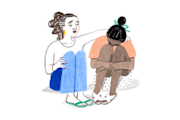It’s October, which means it’s Domestic Violence Awareness Month. Domestic violence is a public health crisis that affects millions of people across the United States and beyond.
Did you know that domestic violence affects over 10 million people in the United States? Yet it’s a topic we still shy away from talking about, due to persistent stigma. This stigma might account for the fact that nearly half of domestic violence survivors never report their abuse to the police.
The COVID-19 pandemic exacerbated the stressors that contribute to domestic violence. Those at risk became more vulnerable due to isolation and quarantining with their abusers.
Because domestic violence remains a taboo subject to discuss, there is a lot of misinformation on the subject. Below, we separate some domestic violence facts from fictions.
6 myths about domestic violence
1. Domestic violence is uncommon
Absolutely not! Domestic violence is quite common. One in four women and one in 10 men will experience sexual violence, physical violence, and/or stalking by an intimate partner during their lifetime.
People experiencing domestic violence tend to be incredibly isolated—and this is by design.
A study conducted by the National Commission on COVID-19 and Criminal Justice found that domestic violence incidents increased by over 8% during quarantine lockdown in 2020.
What we do know about domestic violence is that it transcends age, race, gender, religion, sexual orientation, and socio-economic status. It’s an equal-opportunity offense.
Additionally, physical abuse is almost always accompanied by emotionally abusive and controlling behavior which leaves the victim feeling as though they are trapped in the abusive relationship.

2. Domestic violence is only physical
Abusive behaviors can also include emotional, financial, and sexual abuse. Like many types of behaviors, domestic violence doesn’t always start with a punch or a slap. It often starts with emotionally controlling behaviors, such as gaslighting and intimidation.
3. “Yes, my partner was violent, but it was a one-time thing”
Domestic violence is a pattern of controlling, dominating, and manipulative behavior. Although physical violence may not occur every day, the abuser creates an ongoing environment of control through fear. Domestic violence can escalate in severity over time.
4. Drugs and alcohol cause domestic violence
The use and abuse of drugs and alcohol may aggravate or exacerbate a violent situation, but that does not mean they cause violence.
Drugs and alcohol can lower the inhibitions of a person who is already violent, and although there is no causal relationship between domestic violence and substance abuse, studies show that violent people are more likely to abuse substances.
5. “My partner says they regret hurting me, so they’ll stop"
The only way change occurs is if a change occurs. Promising to stop, begging for forgiveness, appearing to be sorry: these are all manipulative behaviors designed to put a bandaid on the situation to temporarily ameliorate things so the abuser can continue controlling.
6. Women are the only victims of domestic violence
Nope! Men are victims of partner violence, though it is much less common. According to the Bureau of Justice Statistics, about 24% of reported domestic violence victimizations were committed against men.
Although they make up a smaller percentage of reports, there may be many more men who do not report the abuse. This may be due to men not being socialized to express their feelings, the abuse of men is often taken less seriously or the belief that there are no resources available for male victims.
Whatever the reason, men report experiencing domestic violence a fraction as often as do women. Some estimates show that for every one million women who report experiencing violence at the hand of a partner or ex-partner, only 160,000 men do.
5 ways to help a loved one in an abusive relationship
1. Help them create a safety plan
One of the most important things we can do to support someone who is experiencing domestic violence is to help create a safety plan. It can be difficult in a crisis to think rationally and clearly, so consider helping your friend put together a workable plan in a calmer moment.
The plan should include not only strategies for leaving the abusive relationship, but safety measures for when they’re still experiencing the abuse. Finally, a thorough safety plan will include support for after they’ve left.
2. Keep in touch
People experiencing domestic violence tend to be incredibly isolated—and this is by design. A person with few personal connections is easier for an abuser to control. This means staying in touch with a victim might require effort and creativity.
One of the most important things all of us can do is to keep talking about domestic violence.
If the abuser becomes suspicious that communication is occurring with anyone outside their relationship, your friend may be in further danger.
One useful strategy is the use of code words, sentences, or even emojis that can help your friend communicate discreetly safely.

3. Support without judgment
Reassure your friend that they’re not alone and that nothing justifies abusive behaviors. Be patient and give them time to come to their own decision about their situation. Give them space to talk when they are ready. Listen carefully and with empathy and allow them to make their own decisions.
4. Provide resources
Your friend may need a resource for a domestic violence hotline or shelter. To avoid raising suspicions, consider researching resources on your end, then coordinating a safe way to provide these resources to your friend. Continue to use the code words or phrases that you have agreed on to securely deliver the information.
5. Don’t keep quiet
One of the most important things all of us can do is to keep talking about domestic violence. Abusers rely on secret-keeping, so the more dialogue that is created about domestic violence, the more the stigma is erased, and the more likely survivors are to get help.
If you are in immediate danger, call 911.
For anonymous, confidential help, 24/7, call the National Domestic Violence Hotline at 1-800-799-7233 (SAFE).










